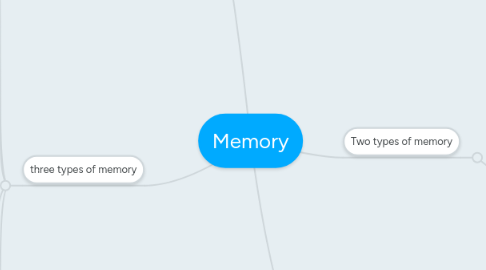
1. three types of memory
1.1. sensory memory
1.1.1. memory system that works for a very brief period of time, keeps information till information is selected for further processing.
1.1.1.1. iconic - visual information
1.1.1.2. echoic - auditory information
1.1.1.3. haptic - touch information
1.1.1.4. gustic - taste information
1.1.1.5. olfactic - smell information
1.2. Working memory
1.2.1. short-term memory system used to store and process information we are currently thinking about
1.2.1.1. storage capacity: 7plus or two minutes. ex: area codes, passwords
1.3. Long Term memory: Encoding
1.3.1. shallow processing
1.3.1.1. focus on physical features of an item rather than its meaning. ex: we see loonies but we cant recall what's on the back or front
1.3.2. deep processing
1.3.2.1. focuses on the meaning of an item and involves forming associations between new and old information. ex: relate information to what you already know.
1.3.3. massed practice
1.3.3.1. when an individual attempts to learn all in one setting. ex: cramming
1.3.4. spaced practice
1.3.4.1. self-referent encoding
1.3.4.1.1. people organize material around their own lives and experiences
1.3.5. distinctiveness
1.3.5.1. item that are unique or distinct are often remembered best (Von restoff effect)
1.3.6. organization
1.3.6.1. organizing information helps facilitate memory
1.3.7. testing effect
1.3.7.1. people who study and test themselves retain information over a longer period of time then people that study some more
1.4. Long Term memory: Retrieval
1.4.1. proactive interference
1.4.1.1. when old, previously learned memories intrude the recall of newer memories
1.4.2. retroactive interference
1.4.2.1. when new info blocks or disrupts retrieval of older info
1.4.3. state-dependent memory
1.4.3.1. when emotional state is the same when being tested and when you were tested
2. Elizabeth Lofus
2.1. She demonstrated the misinformation introduced after an event can alter our recollection of the original event. Also that people can be made to believe that events that never happened, this is called " false memory effect"
3. Explicit memory (involves effort and intention) ex: recalling the name of an old friend
3.1. working memory
3.1.1. Short-term memory system, lasts anywhere from 2 - 18 seconds. ex: dialing a phone number
3.2. episodic memory
3.2.1. long-term memory system, stores info about specific events. ex: party you attended
3.3. semantic memory
3.3.1. long-term memory system that stores general knowledge. ex: stores are vocabulary or facts
4. Two types of memory
4.1. Implicit memory (involves no effort) ex: riding a bike
4.1.1. priming
4.1.1.1. The automatic or unconscious process that can enhance the speed and accuracy of a response as a result of past experience. ex: you see yellow you'll faster recognize the word banana.
4.1.2. procedural memory
4.1.2.1. Memory for the process involved in completing a task after the task is well learned and has become automatic. ex: playing the piano
4.1.3. conditioning
4.1.3.1. A memory for associations formed between 2 stimuli. ex: Pavlov's dogs
